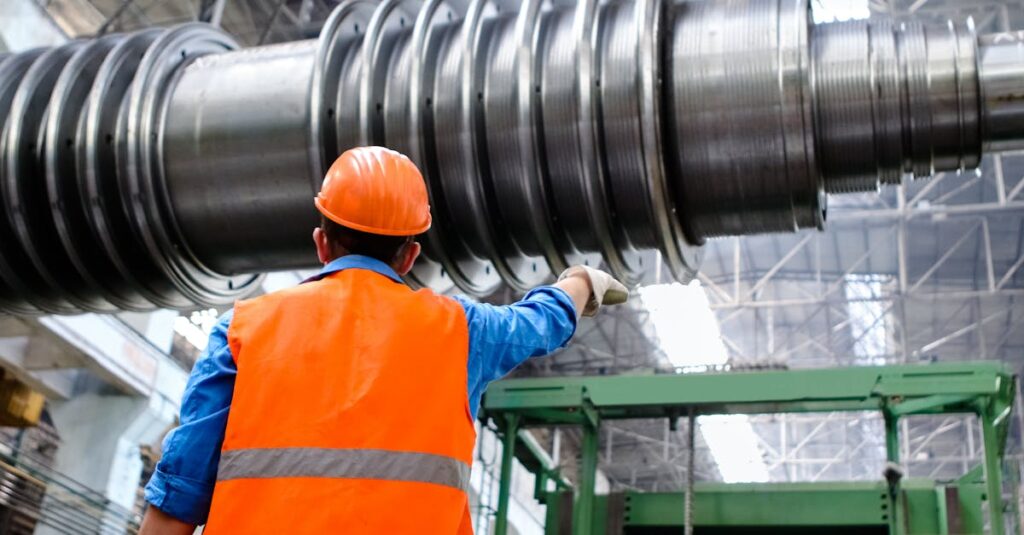
Program Overview
Program Duration: 2 Years (4 Semesters) Qualification Level: Diploma
The Diploma in Mechanical Engineering at Summit Heights Institute is a forward-thinking program designed to cultivate highly skilled and adaptable mechanical engineering technologists. This curriculum is meticulously developed to align with current market demands and global industry trends, emphasizing areas such as advanced manufacturing, sustainable energy systems, mechatronics, automation, and digital engineering tools. Graduates will be equipped with a strong foundation in core mechanical principles, coupled with practical expertise in modern technologies, preparing them for diverse roles in design, manufacturing, operations, maintenance, and research across various industries.
Key Program Pillars
- Core Mechanical Principles: A robust understanding of mechanics, materials, thermodynamics, and fluid dynamics.
- Advanced Manufacturing: Proficiency in traditional and cutting-edge manufacturing processes, including additive manufacturing and CNC.
- Mechatronics & Automation: Integration of mechanical, electrical, and computer systems for intelligent machine design and industrial automation.
- Sustainable Engineering: Focus on energy efficiency, renewable energy technologies, and environmentally conscious design.
- Digital Engineering Tools: Hands-on expertise with industry-standard CAD, CAM, CAE (FEA/CFD), and simulation software.
- Problem-Solving & Innovation: Developing critical thinking and practical application skills through project-based learning.
- Industry Standards & Safety: Adherence to engineering codes, safety protocols, and professional ethics.
Learning Outcomes
Upon successful completion of this Diploma, graduates will be able to:
- Apply fundamental principles of statics, dynamics, strength of materials, thermodynamics, and fluid mechanics to analyze and solve mechanical engineering problems.
- Design and analyze mechanical components and systems using industry-standard CAD software.
- Understand and select appropriate materials and manufacturing processes for various engineering applications, including advanced and additive manufacturing.
- Analyze and troubleshoot thermal and fluid systems, including heat exchangers and power cycles.
- Integrate mechanical, electrical, and control elements to design and implement basic mechatronic systems.
- Understand and apply principles of industrial automation, including robotics and Programmable Logic Controllers (PLCs).
- Evaluate and propose sustainable engineering solutions, including renewable energy technologies and energy efficiency measures.
- Utilize simulation software (FEA, CFD) for basic analysis of mechanical designs.
- Adhere to engineering standards, safety regulations, and ethical practices in all professional activities.
- Communicate technical information effectively, both verbally and in writing, and collaborate effectively in multidisciplinary teams.
- Manage and execute mechanical engineering projects from conception to completion.
Curriculum Structure
Year 1: Foundational Principles & Engineering Tools
Semester 1
- ME101: Engineering Mathematics I
- Description: Covers essential mathematical concepts including algebra, trigonometry, functions, vectors, complex numbers, and an introduction to differential and integral calculus, with applications to mechanical engineering problems.
- Learning Outcomes: Solve engineering-related mathematical problems; apply calculus to simple mechanical contexts; use complex numbers for AC circuit representation (relevant for mechatronics).
- ME102: Engineering Physics for Mechanical Systems
- Description: Explores fundamental physics principles crucial for mechanical engineering, including classical mechanics (kinematics, dynamics, forces, energy), properties of matter, and an introduction to waves and basic thermodynamics.
- Learning Outcomes: Explain basic physical phenomena; apply physics principles to mechanical systems; understand the relationship between physical laws and engineering concepts.
- ME103: Introduction to Mechanical Engineering & Professional Practice
- Description: Provides an overview of the mechanical engineering discipline, its various sub-fields, and career opportunities. Introduces engineering ethics, professional responsibility, and the importance of lifelong learning.
- Learning Outcomes: Describe the scope of mechanical engineering; understand ethical considerations in engineering; identify career paths in mechanical engineering.
- ME104: Engineering Graphics & CAD Fundamentals
- Description: Develops skills in technical drawing, orthographic and isometric projections, sectional views, and dimensioning. Introduces 2D and 3D Computer-Aided Design (CAD) software for creating engineering drawings and models.
- Learning Outcomes: Create professional engineering drawings; use CAD software for basic 2D and 3D modeling; interpret engineering blueprints.
- ME105: Workshop Practice & Safety
- Description: Provides hands-on experience with common workshop tools and equipment. Covers basic machining operations (turning, milling), welding fundamentals, sheet metal work, and emphasizes workshop safety procedures and best practices.
- Learning Outcomes: Safely operate basic workshop machinery; perform fundamental machining and fabrication tasks; adhere to industrial safety standards.
Semester 2
- ME106: Statics & Strength of Materials I
- Description: Introduces the principles of static equilibrium, force systems, moments, and friction. Covers concepts of stress, strain, elastic deformation, axial loading, torsion, and bending in simple structural elements.
- Learning Outcomes: Analyze forces in static systems; calculate stress and strain in basic components; determine deflections under simple loading conditions.
- ME107: Thermodynamics I
- Description: Covers fundamental concepts of thermodynamics, including systems, properties, work, heat, and the First and Second Laws of Thermodynamics. Introduces ideal gases, pure substances, and basic thermodynamic cycles.
- Learning Outcomes: Apply the laws of thermodynamics; analyze basic thermodynamic cycles; calculate energy transfer in simple systems.
- ME108: Materials Science & Engineering
- Description: Explores the structure, properties, and processing of engineering materials, including metals, ceramics, polymers, and composites. Focuses on material selection criteria for various mechanical applications.
- Learning Outcomes: Classify engineering materials; relate material microstructure to properties; select appropriate materials for design applications.
- ME109: Fluid Mechanics I
- Description: Introduces the fundamental properties of fluids, fluid statics, manometry, and basic principles of fluid flow (continuity equation, Bernoulli’s equation). Covers laminar and turbulent flow concepts.
- Learning Outcomes: Analyze fluid static problems; apply continuity and Bernoulli’s equations; understand basic fluid flow phenomena.
- ME110: Introduction to Programming for Engineers (Python/MATLAB)
- Description: Teaches fundamental programming concepts, data structures, control flow, and algorithms using a relevant language (e.g., Python or MATLAB). Focuses on solving engineering problems, data analysis, and automation of calculations.
- Learning Outcomes: Write basic programs to solve engineering problems; automate calculations; perform simple data analysis using code.
Year 2: Applied Design, Systems & Modern Technologies
Semester 3
- ME201: Dynamics & Vibrations
- Description: Covers kinematics and kinetics of particles and rigid bodies, including Newton’s laws, work-energy, and impulse-momentum principles. Introduces concepts of mechanical vibrations, natural frequency, and damping.
- Learning Outcomes: Analyze motion of mechanical systems; solve kinetics problems; understand basic vibration phenomena.
- ME202: Thermodynamics II & Heat Transfer
- Description: Builds on Thermodynamics I, covering advanced power and refrigeration cycles (e.g., Rankine, Brayton, Vapor-Compression). Introduces the three modes of heat transfer: conduction, convection, and radiation, with practical applications.
- Learning Outcomes: Analyze complex thermodynamic cycles; calculate heat transfer rates in various scenarios; design simple heat exchange systems.
- ME203: Machine Design I
- Description: Focuses on the design and analysis of common mechanical components such as fasteners, shafts, keys, couplings, bearings, and gears. Emphasizes stress concentration, fatigue, and failure theories.
- Learning Outcomes: Design and select standard machine components; perform stress and fatigue analysis; apply failure theories in design.
- ME204: Manufacturing Processes & Materials Processing
- Description: Explores a wide range of manufacturing processes, including casting, forming (forging, rolling), material removal (machining, grinding), joining (welding, brazing), and surface treatments. Introduces CNC machining and basic additive manufacturing (3D printing).
- Learning Outcomes: Describe various manufacturing processes; select appropriate processes for component fabrication; understand the principles of CNC and additive manufacturing.
- ME205: Mechatronics & Control Systems Fundamentals
- Description: Integrates mechanical, electrical, and computer engineering principles. Covers sensors, actuators, microcontrollers, data acquisition, and introduces basic open-loop and closed-loop control systems.
- Learning Outcomes: Identify and select sensors and actuators; program microcontrollers for basic control; understand the concept of feedback control.
Semester 4
- ME206: Fluid Mechanics II & Hydraulics/Pneumatics
- Description: Continues with advanced fluid flow topics, including pipe flow, minor losses, and flow measurement. Introduces the principles, components, and applications of hydraulic and pneumatic power systems in industrial settings.
- Learning Outcomes: Analyze fluid flow in pipes; design basic hydraulic and pneumatic circuits; troubleshoot fluid power systems.
- ME207: Sustainable Engineering & Energy Systems
- Description: Focuses on the application of mechanical engineering principles to sustainable solutions. Covers renewable energy technologies (solar thermal, wind power, biomass), energy efficiency in buildings and industrial processes, and life cycle assessment.
- Learning Outcomes: Evaluate different renewable energy sources; propose energy efficiency improvements; conduct basic life cycle assessments.
- ME208: Advanced CAD/CAM & Engineering Simulation
- Description: Builds on CAD fundamentals with advanced 3D modeling techniques (surface modeling, assemblies). Introduces Computer-Aided Manufacturing (CAM) for CNC programming and provides an introduction to Finite Element Analysis (FEA) and Computational Fluid Dynamics (CFD) for design validation.
- Learning Outcomes: Create complex 3D assemblies; generate CNC toolpaths; perform basic FEA and CFD simulations for design validation.
- ME209: Industrial Automation & Robotics
- Description: Delves deeper into industrial automation systems, including Programmable Logic Controllers (PLCs) programming, Human-Machine Interfaces (HMIs), and SCADA systems. Introduces robotics kinematics, trajectory planning, and industrial robot applications.
- Learning Outcomes: Program industrial PLCs; understand HMI and SCADA systems; explain basic robotic operation and applications.
- ME210: Mechanical Engineering Capstone Project
- Description: A culminating, hands-on project that requires students to design, analyze, build (or simulate), and test a mechanical system or solution addressing a real-world engineering challenge. The project integrates knowledge and skills acquired throughout the diploma, culminating in a comprehensive report, prototype/simulation, and presentation.
- Learning Outcomes: Apply integrated mechanical engineering knowledge to a complex project; conduct design, analysis, and testing; manage project timelines and resources; present technical findings professionally.
